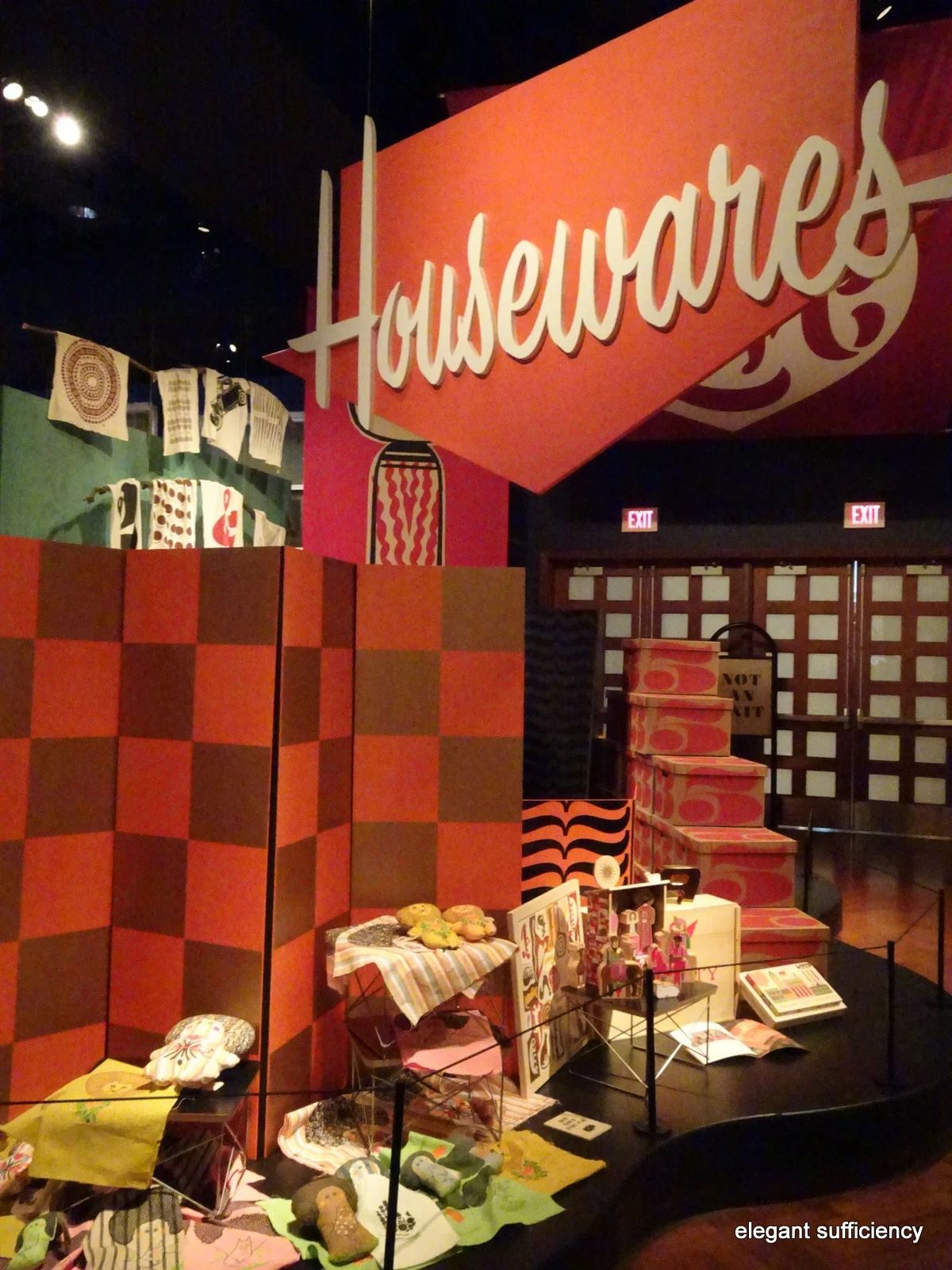The Henry Ford
Leaving Lansing on a Sunday morning, we anticipated a lunchtime arrival in Detroit. Perfect for an afternoon at the Henry Ford then.
We hoped the owners of the car parked next to us remembered they’d left their drinks on the back of their vehicle before they drove off!
It being Father’s Day, it was pretty busy. It was also pretty pricey and with only a basic idea of what was to see and do here, we struggled to decide which ticket to buy. My Hero returned from the queue with combined museum/village entry for the three of us and eyeing the darkening skies outside, it seemed the logical thing to head for the museum first.
Stepping inside the entrance though, we wondered what we’d just paid for.
There appeared to be a random display of old agricultural vehicles on one side and vintage kitchens and furniture on the other.
Well, we weren’t too interested in the tractors, so headed towards the furniture, finding solace in the exhibit about the construction of an Eames reclining chair – Made in Michigan, it seems!
Across the way was a bright and quirky space which immediately attracted our attention. We headed there next.
We had no idea what the exhibition was about, but there were a few colourful things on display and it was surely going to be more interesting than old tractors.
Perhaps it was about creativity?
I was attracted by the items chosen to display and the overall style, but I wasn’t quite sure what it was about.
Living a good life, perhaps? We’ve noted how there’s a number of new magazines on the shelves here concerning wellness, creativity and mindfulness.
But Evil Knieval’s jumpsuit? Maybe it’s about taking risks too?!
We were a little confused but hey, the displays were well put together and I was curious enough to want to see more.
So we carried on through.
There was certainly the most unusual collection of things on display.
Including a display of fonts.
I think I’d heard of Rat Fink Fonts.
Several of the exhibits concerned fonts and lettering. Maybe that was the theme?
Or?
But just as I thought I’d got it, I spotted Heath Ceramics, another familiar brand.
Alongside was a different pottery brand.
Across the way was a display of Herman Miller goods too. They’re the firm that makes the Eames chairs amongst other things. But there’s lettering there too. Hmmm.
I caught up with Mark and Mary by the silk screen printing display. “Have you worked out what this is all about yet?” they asked. Hah. I’d been about to ask the same question!
I replied that I had no idea, but I was enjoying the exhibits and was taking plenty of photographs in the hope of working it all out later!
But standing nearby was a young woman staff member and rather than wonder any longer, I thought I’d ask her to explain. Please.
We hadn’t been far from the right idea, but hadn’t quite got it yet. House Industries had started life as a design house, branching out into font designs along the way. The exhibition’s intent was to show how early enthusiasms had influenced the designers’ later work, which included graphics for Heath Ceramics and Herman Miller amongst others (Adele, Shake Shack, The New Yorker…the list goes on)
The last display showed the designers at work, alongside their products. Maybe we should have started here?
But it appeared we were not alone in not quite getting the point of the exhibition. We’d missed the explanatory introduction at the entrance “but everyone does – no-one reads it”
Well yes. Later we returned and there it was. We watched as visitors arrived and saw their eyes fall on those colourful dolls and bright banner on the left, not even noticing the panel on the right which was so dull in comparison.
Exhibition design! But how surprising that a design-led exhibition got it wrong!
Having worked it out, we enjoyed it all the more and felt rather more positive about the museum as a whole as a result.
Now, how about this, the Dymaxion House? Buckminster Fuller’s 1946 design for prefabricated housing to accommodate large numbers of people returning from WW2.
Well, interesting but rather strange inside. No wonder it didn’t fly (metaphorically speaking!)
Next up, an exhibit of recent history, aimed at a series of generations from the Eisenhower generation right through to Generation X. We found some aspects amusing – I stood and listened to Blondie on an 8-track stereo whilst Mary and Mark sat on a sofa watching 1970s TV. But seeing the (very popular) children’s hands-on Lego table overshadowed by the Shotguns and Rifles exhibit right next to it cancelled out some of those more positive feelings I was having about the place.
Around the corner was a “rights and responsibilities” area, with four distinct areas which matched four of our road trips: Womens’ Suffrage (Boston to Chicago, 2014), Civil Rights (the South, 2016), Independence (Washington to Savannah, 1999, pre blog!) and Freedom and Equality (Little Rock to Chicago 2015)
But with an eye on the time, and bearing in mind we hadn’t even thought about the village yet, we decided to focus on the flight exhibit, around the corner. Here was a Ford Flivver, Henry Ford’s personal airplane design, the “Model T of the air”. He imagined that everyone would have their own plane in time, but after the sad demise of his test pilot on a test flight, plans for mass production were shelved.
The Ford Trimotor was here too, with pictures of wicker chairs inside and maps of the four day journey across the country. We moved quickly on to other, more serious designs.
There were three grades of airplanes to fold; beginner, intermediate and advanced. I started with the beginner model whilst my hero folded an intermediate level design. Whilst he took my simple plane for its test flight, I moved quickly onto the advanced model.
Both survived for eventual display in the journal!
unlike others, which ended in the scrap bucket!
There were cars here, of course, including this Ford Edsel, a short-lived design of the late 1950s.
My Hero had eyes on the Railroad engines though – enormous beasts like this Allegheny of the Chesapeake and Ohio Railroad.
An enormous Canadian Pacific snowplough was nearby, dwarfing the smaller, older engines – and those standing alongside.
By now, we were more or less back where we’d started, but a glance at the time confirmed that there was no way we were going to be able to do Greenfield Village justice before the closing time of 5pm. Perhaps we could request a raincheck on that half of our ticket and come back tomorrow? My Hero headed back to the entrance and asked the question. We could but hope.
Well, he who asks, gets! Yes, of course….the unused ticket is valid until 2088!
Feeling positive once more, we looked at the plan to check if we’d missed anything.
I decided I’d like to pay another visit to the furniture display, to see how my Eames rocker was made.
As I watched the video of moulding fibreglass, I spotted my desk chair right opposite – a Herman Miller design, too. Who knew that we owned Michigan-made chairs at home? I only knew them to come from John Lewis!
As we left the museum, we reflected on the pros and cons of our visit. It had been a bit of a mixed bag, but the flexibility of the ticket had won us over in the end. Nevertheless, it’s an odd collection of “innovations” and in showing such a huge range of exhibits, it loses focus. So, there are railroad engines, but it’s not really a railroad museum. There are cars, but neither is it a motor museum. We felt nothing was done spectacularly well and yet, we were glad we’d been. The House Industries display was fascinating, once we’d worked it out and I’d say that was probably my favourite part.
I thought I’d leave it with a picture of the most valuable exhibit (or so I was told). The floor. Nine acres of solid teak flooring, with each one of those planks worth $20, the elderly gentleman said.
So this evening, we’re in Detroit, having passed the bridge to Canada as we arrived.
It was a great night for a fish supper too and the Huron Room was a good choice!










